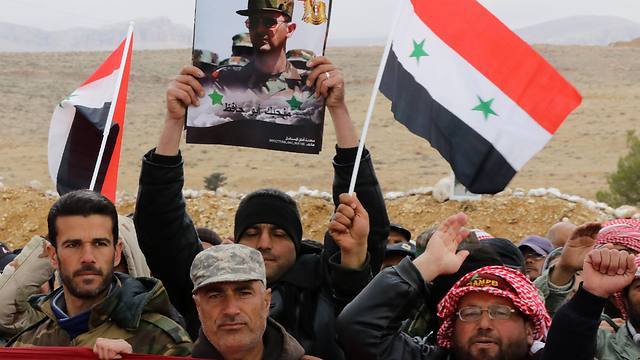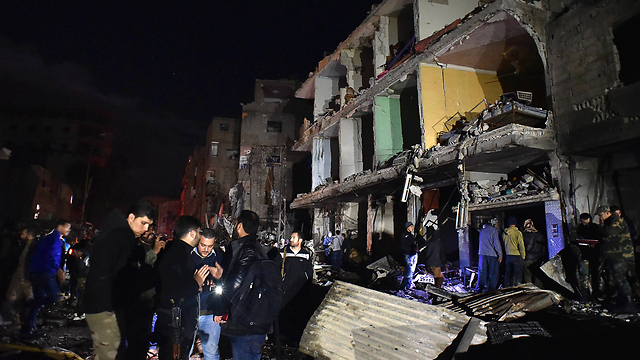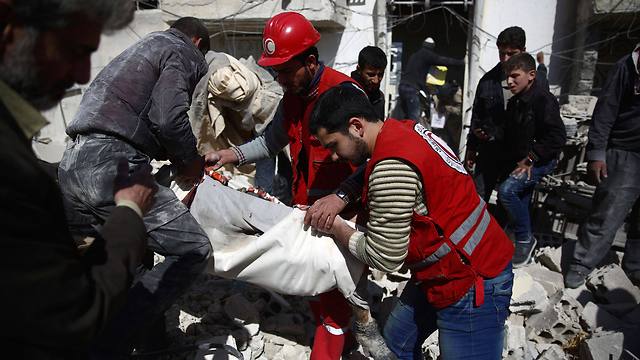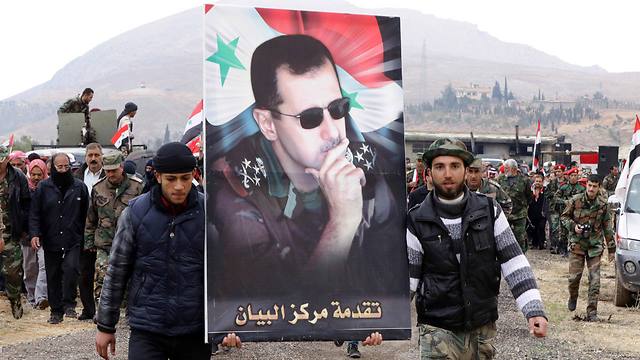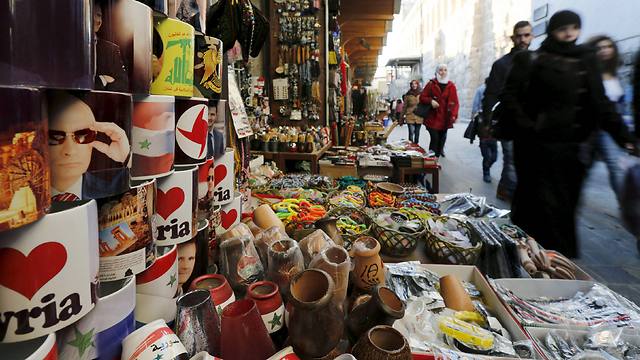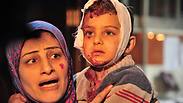
Syrian rebels say attacked by Assad forces in breach of ceasefire
ISIS bombings kill six in Hama, and UN reports isolated fire in western Syria; dozens killed in battles and airstrikes before 'cessation of hostilities' comes into effect.
A Syrian rebel commander said on Saturday that government shelling had stopped in some parts of Syria but continued elsewhere in what he described as a violation of a cessation of hostilities agreement that came into effect at midnight.
Fares Bayoush, head of the Fursan al-Haqq rebel group which fights under the banner of the Free Syrian Army, told Reuters that continued violations could lead to a collapse in the agreement.
"There are areas where the bombardment has stopped but there are areas where there are violations by the regime such as Kafr Zeita in Hama, via targeting with artillery, and likewise in Morek in northern Hama countryside," he said, adding that FSA groups remain committed to the truce.
Bayoush said it was normal for violations to take place in any truce but the other side should halt them if it was serious about the agreement.
Syrian rebels in the country's northwest said they came under attack from government ground forces at 4am (2am GMT) on Saturday.
Three fighters from the rebel Second Coastal Division were killed while repelling the attack in the Jabal Turkman area near the Turkish border in Latakia province, Fadi Ahmad, spokesman for the affiliated First Coastal Division, told Reuters.
"It is a violation (of the agreement)," Ahmad said, describing the attack as a ground assault with no air strikes. "Currently, the regime has halted the attack," he added.
The First and Second Coastal Divisions are part of a loose alliance of rebel groups known as the Free Syrian Army.
Northwestern Syria is one of the areas where the Nusra Front operates near rebel groups that have approved the cessation of hostilities. Ahmad said the positions attacked on Saturday are controlled by his group, and the Nusra Front has no presence there. Nusra has called for an escalation of attacks.
In the Eastern Ghouta near Damascus, government forces reportedly dropped two barrel bombs and opened fire on positions of the Syrian rebel group Jaish al-Islam.
Citing field reports from the group's commanders, Jaish al-Islam spokesman Islam Alloush told Reuters that in one incident government forces trying to advance "were dealt with with machine guns".
The Syrian military denied having breached the ceasefire. The Syrian government has said it will respect the agreement drawn up by Russia and the United States, but that it will continue to fight the al Qaeda-linked Nusra Front and Islamic State which are not covered by the deal.
On its part, Syria's state-run news agency reported that armed groups have fired several shells on residential areas in Damascus.
SANA reported the shells were fired by "terrorist groups" entrenched in Jobar and Douma, both opposition-held suburbs of the Syrian capital.
Meanwhile, six people were killed and several wounded in two attacks by suicide bombers in Syria's Hama province on Saturday, state television reported.
Syria's state news agency said a bomber driving a car loaded with explosives blew himself up in the early hours, killing two people on the edge of the town of Salamiya. Another suicide bomber on a motorbike struck at the entrance to the village of Teeba, killing four people, soon afterwards.
The Islamic State group claimed responsibility for the car bombing. The group said in an online statement that one of its fighters had driven a car loaded with explosives to a Syrian army gathering in the area and blown himself up among them, killing 20 people and wounding 35 others.
"The car bomb attack is not a breach to the truce because it occurred in an area where the cessation of hostilities agreement does not apply," Rami Abdulrahman from the Britain-based Syrian Observatory for Human Rights told Reuters.
ISIS fighters also stormed a northern border town of Tal Abyad that was captured months ago by Kurdish fighters, according to Talal Sillo, a spokesman for the predominantly Kurdish Syria Democratic Forces.
The fighting began after midnight Friday and was still ongoing, Sillo said. Tal Abyad that has been held by Kurdish fighters since July.
The Observatory also confirmed the fighting in Tal Abyad.
The Aamaq news agency, which is affiliated with the extremist group, reported that ISIS fighters launched a "surprise attack" on several areas in northern Raqqa province, where Tal Abyad is located. But the report did not provide further details.
Sillo told The Associated Press that SDF fighters "will finish the operation today."
Calm in most areas as fragile ceasefire starts
The Observatory said there was calm in many parts of the country shortly after midnight when the agreement came into effect.
"Let's pray that this works because frankly this is the best opportunity we can imagine the Syrian people has had for the last five years in order to see something better and hopefully something related to peace," said UN Syria envoy Staffan de Mistura.
Nusra Front, one of Syria's most powerful Islamist rebel groups, on Friday urged insurgents to intensify their attacks on President Bashar Assad and his allies, adding to dangers facing the agreement.
Fighting raged across much of western Syria right up until the cessation came into effect, the Britain-based Syrian Observatory for Human Rights said.
There was calm in many parts of the country shortly after midnight, it said.
"In Damascus and its countryside ... for the first time in years, calm prevails," Observatory director Rami Abdulrahman said.
"In Latakia, calm, and at the Hmeimim air base there is no plane activity," he said, referring to the Latakia base where Russia's warplanes operate.
Some gunfire had been heard shortly after midnight in the northern city of Aleppo, and there were some blasts heard in northern Homs province, but it was not clear what had caused them, Abdulrahman said.
The United Nations unanimously demanded late on Friday that all parties to the conflict comply with terms of the plan as part of efforts to end a war that has killed more than 250,000 people and driven 11 million from their homes. De Mistura said he intends to restart peace talks on March 7, provided the halt in fighting largely holds.
On Friday, at least 40 government soldiers and allied fighters and 18 insurgents were killed in battles and air strikes in Latakia province, the Observatory reported.
Six people were also killed in an air raid in western Aleppo province in the hours before the halt, it said.
Near Damascus, dozens of air raids hit the besieged suburb of Daraya. Rescue workers said at least five people were killed in Douma, northeast of the capital.
Russian President Vladimir Putin stressed on Friday that combat actions against Islamic State, the Nusra Front and other groups the Syrian government regards as terrorists would continue.
The United States said it was time for Russia to show it was serious about halting fighting by honoring a commitment not to strike Syrian groups that are part of the moderate opposition.
'End this horrendous conflict'
The cessation agreement has not been signed by the Syrian warring parties themselves and is less binding than a formal ceasefire. A halt in fighting is desperately needed to get aid to besieged areas of the country.Some relief has got to these regions in a series of localized agreements this year, but the United Nations demands unhindered access to all Syrians in need of help.
The Red Cross called for an end to the conflict in which most regional and world powers are now involved.
"It is time for the warring parties to end this horrendous conflict and for the world powers who can influence the situation to act decisively," its President Peter Maurer said in a statement.
"The most urgent thing is to increase humanitarian aid ... Humanitarian deliveries must not depend on political negotiations," he said.
The United Nations describes the cessation as something that would precede the more formal ceasefire it is hoping to establish at some future date.
Peace talks collapsed earlier this month before they began, and Damascus and Moscow intensified assaults in the north and northwest of the country.
Moscow's intervention in the war in September with an air campaign has helped Assad's forces and their allies recapture territory, notably in Aleppo and Latakia provinces.
Rebels have advanced elsewhere, including in Hama province, but fighting has largely tipped in favor of Damascus, which is also backed by Lebanese Hezbollah and Iranian fighters.
Saudi Arabia, which supports insurgents, has said it is willing to send its forces into Syria to fight Islamic State, and Turkey, another Assad opponent, wants ground troops deployed but has denied plans for unilateral action.
The Syrian government has said the cessation plan could fail if foreign states supply rebels with weapons or insurgents use the truce to rearm.
The main Saudi-backed opposition alliance, which has deep reservations, said it would accept it for two weeks but feared the government and its allies would use it to attack rebel factions under the pretext that they were terrorists.
The US-backed Kurdish YPG militia, which is battling Islamic State in the northeast and Turkish-backed rebel groups in the northwest, said it would abide by the plan, but reserves the right to respond if attacked.
Fighting between the YPG and Islamic State continued in Raqqa province, the Observatory said.










